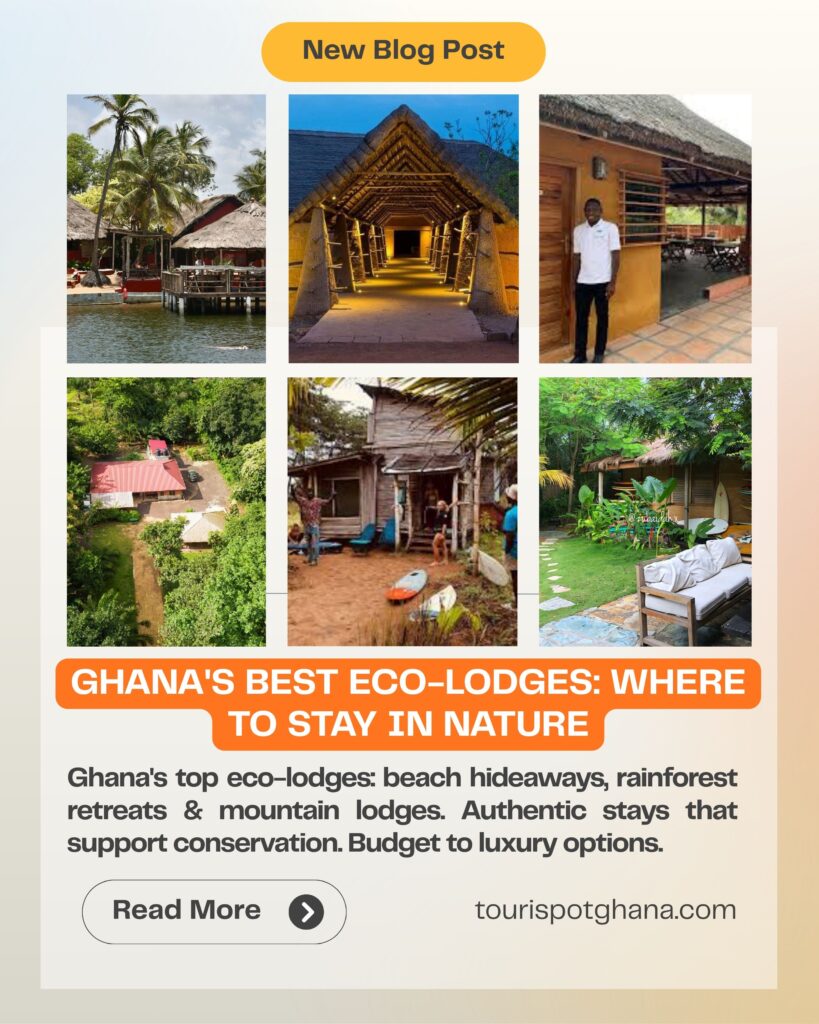Ghana has quietly become one of West Africa’s most exciting destinations for eco-conscious travelers. While safari giants like Kenya and Tanzania grab headlines, this welcoming nation offers something different—intimate encounters with nature that don’t compromise on authenticity or environmental responsibility. From the misty mountains of the Volta Region to the pristine rainforests of the Western Region, Ghana’s eco-lodges are rewriting the script on sustainable tourism in Africa.
What makes these places special isn’t just their commitment to solar power or composting toilets (though those matter). It’s the way they’ve woven themselves into the fabric of local communities, creating genuine economic opportunities while protecting some of the continent’s most threatened ecosystems. These aren’t corporate resorts masquerading as eco-friendly—they’re passion projects built by people who actually care about the land and the communities that call it home.
Why Ghana’s Eco-Lodges Stand Out
Before we dive into specific properties, let’s talk about what makes Ghana’s approach to eco-tourism different. Unlike some destinations where “eco” is just marketing speak, Ghana’s best sustainable lodges were often pioneering conservation efforts before eco-tourism was even trendy. Many emerged from community-based tourism projects in the 1990s and early 2000s, created in partnership with local villages, the Ghana Tourism Authority, and international NGOs.
The result? Accommodations that feel authentic because they are. You’re not just staying near a community—you’re directly supporting families, schools, and conservation initiatives. Plus, Ghana’s relatively undiscovered status means you won’t be fighting crowds for that perfect sunrise view or wildlife sighting.
The Best Eco-Lodges in Ghana
1. Tagbo Falls Lodge (Liati Wote, Volta Region)
The Experience: Nestled on the edge of Liati Wote village, at the foot of Ghana’s highest peak, Mount Afadjato, Tagbo Falls Lodge feels less like a hotel and more like coming home to a place you’ve never been. This is the kind of spot where you fall asleep to the sound of rushing water from the nearby Tagbo River and wake up to mist rolling through the mountains—assuming the rooster doesn’t wake you first, which, let’s be honest, he probably will.
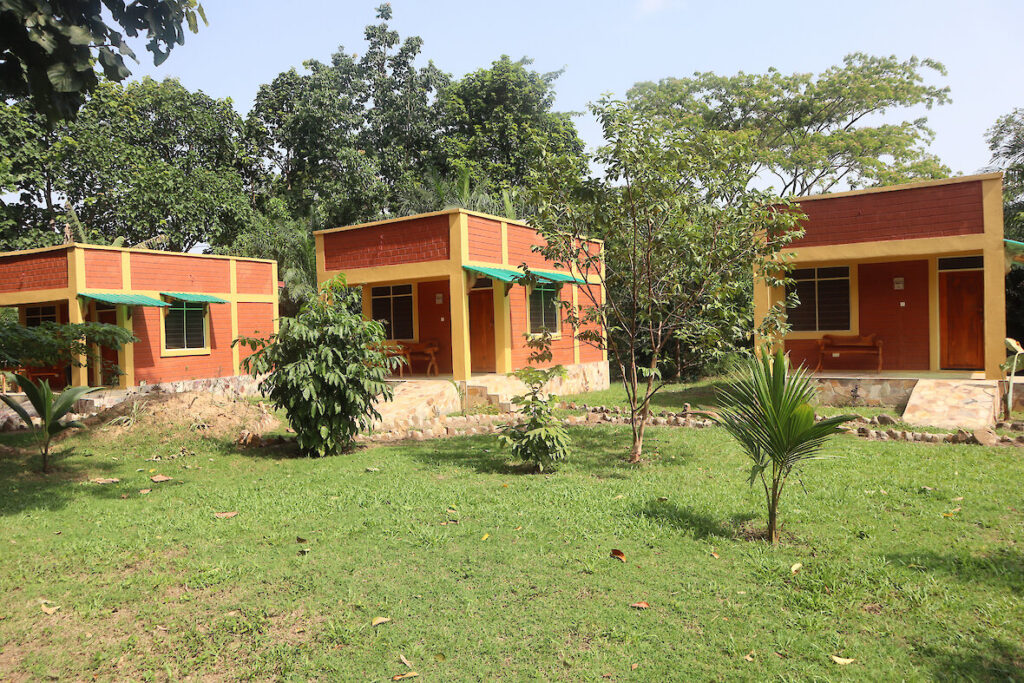
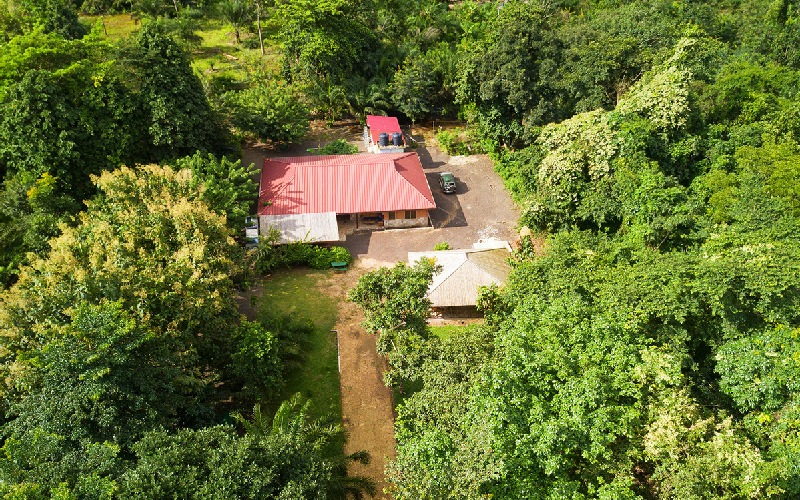
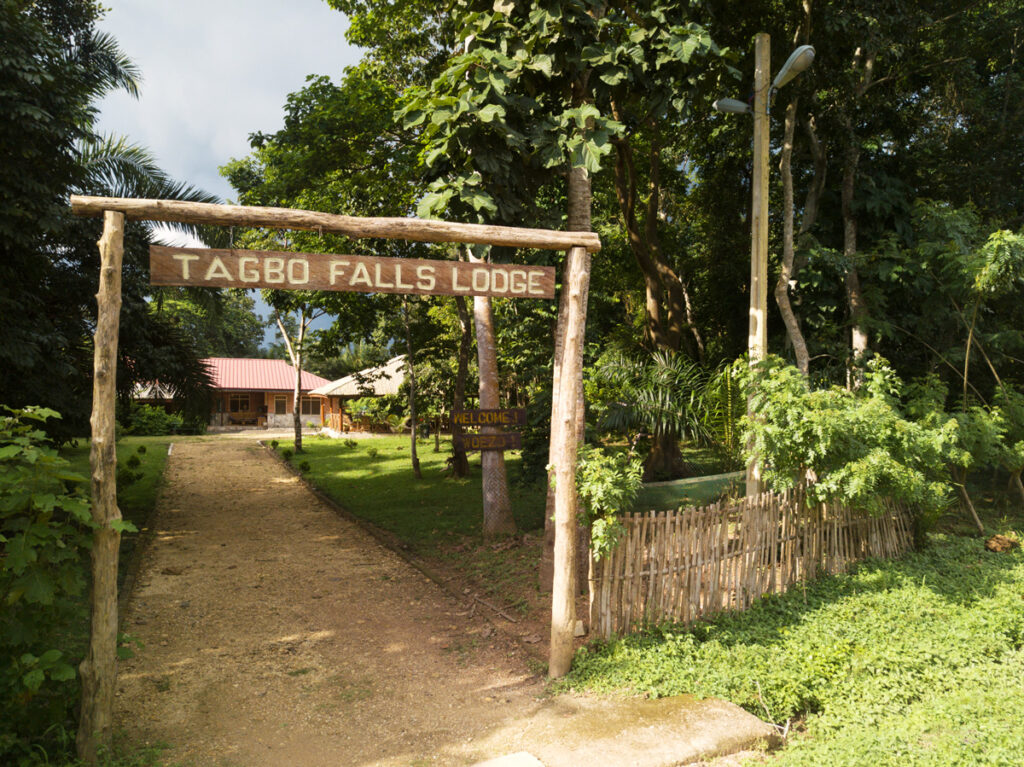
What Makes It Special: Owned and operated by Jolinaiko Eco Tours, this lodge represents everything community-based tourism should be. The relationship between the lodge and Liati Wote village runs deep—income generated from tourism flows directly into community development, and locals are employed across all aspects of lodge operations. The legendary Philomena (affectionately known as “Philo”), who serves as chef and manager, is also the Queen Mother of Kpando, bringing both culinary expertise and cultural authenticity to every meal.
The food here deserves its own paragraph. Philo’s cooking has earned a cult following among travelers, combining local Ghanaian dishes with international options, all prepared with ingredients from nearby farms and the lodge’s own gardens. The coffee? Some of the best you’ll find in Ghana, grown in the surrounding hillsides.
Activities & Surroundings: This is an outdoor enthusiast’s paradise. The relatively easy 45-minute hike to Tagbo Falls takes you through coffee plantations and tropical farmland to a beautiful waterfall where you can swim in cool mountain water. For something more challenging, the hike to Mount Afadjato’s 885-meter summit takes about 1.5 hours and rewards you with stunning views over the lush mountains of eastern Ghana and western Togo. On clear days, you can even spot Lake Volta in the distance.
Beyond hiking, you can explore the village by bike, join local farmers in their fields, participate in traditional cooking sessions, or simply relax in one of the hammocks scattered around the property with a good book. The lodge has limited Wi-Fi (which many guests consider a feature, not a bug), so this is truly a place to disconnect and slow down.
Accommodation: The lodge offers several room types, from traditional guesthouse rooms to newer standalone houses with excellent bathrooms. All are clean, comfortable, and designed to fit naturally into the landscape. Don’t expect luxury amenities—ceiling fans provide ventilation, not air conditioning, and the aesthetic is rustic charm rather than five-star polish.
Sustainability Practices: The lodge emphasizes low-impact tourism, working closely with the village to ensure tourism benefits the entire community, not just a few individuals. They source food locally, employ village residents, and support local initiatives. The lodge also serves as a model for other community-based tourism projects in Ghana.
Getting There: From Accra, take a bus to Ho (the largest city in the Volta Region), then hire a private taxi to Liati Wote. The journey is part of the adventure, though if you value comfort over authenticity, arranging a private vehicle for the entire journey is worth considering.
Budget: Mid-range. Rooms typically range from $30-60 per night, with meals additional but very reasonably priced.
2. Escape3Points Ecolodge (Cape Three Points, Western Region)
The Experience: If you’ve ever fantasized about running away to a secluded beach where nobody can find you, Escape3Points is that fantasy made real. Located at Ghana’s southernmost tip—the closest land point to where the prime meridian and equator intersect—this off-grid paradise sits between two rivers that flow into the Atlantic Ocean, surrounded by one of Ghana’s last remaining semi-deciduous coastal forests.
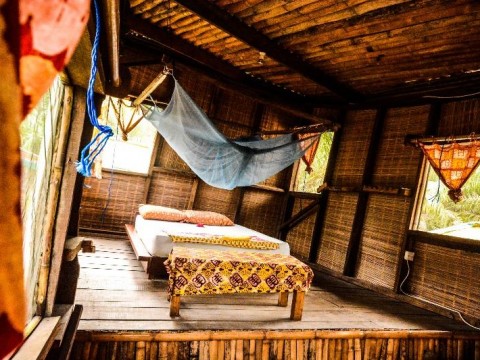
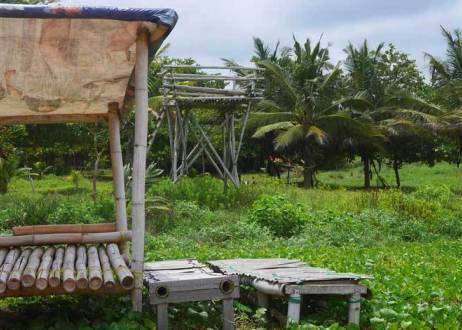
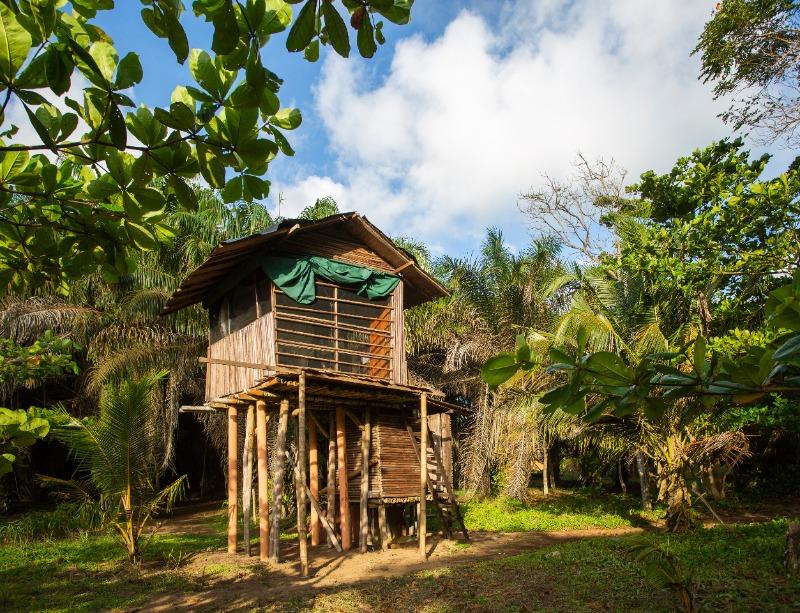
What Makes It Special: Owner Akwasi McLaren, an architect with Ghanaian-Canadian roots, started building Escape3Points in 2008 with a clear vision: create a true escape from modern life without destroying the environment in the process. Every structure on the property—from the individual chalets to the composting toilets—has been hand-built using natural and recycled materials including bamboo, raffia, thatch, and reclaimed wood.
This isn’t Instagram eco-tourism. It’s the real deal. Solar panels provide the only electricity. There’s no hot water (you won’t miss it in this climate). Composting toilets replace flush systems. The organic farm supplies much of the food served in the restaurant. Even the bar stocks impressive homemade akpeteshie (local spirit) in multiple flavors that would put craft distilleries to shame.
Activities & Surroundings: Cape Three Points is one of Ghana’s premier surf spots, and the lodge rents surfboards and can arrange lessons. The beach here is remarkably clean—arguably the cleanest in Ghana—and you’ll often have long stretches entirely to yourself except for the occasional local fisherman or schoolkid.
The surrounding forest offers excellent hiking opportunities, and the lodge participates in sea turtle conservation programs (November to March is nesting season). There’s yoga in the beautiful open-air shala, volleyball on the beach, table tennis, and foosball. Or you can simply claim a hammock and a good book and do absolutely nothing, which might be the most valuable activity of all.
About a 20-minute walk up the coast sits the Cape Three Points Lighthouse, perched dramatically on the cliffs with stunning views. If you’re very lucky, you might spot whales offshore during migration season.
Accommodation: Ten unique chalets with private bathrooms, each with its own architectural character, plus a 10-bed dormitory for budget travelers. This is rustic luxury—no air conditioning, just natural sea breezes. You shower using the traditional scoop method. Some chalets feature outdoor showers under the stars, which sounds romantic until you actually do it and realize it’s even better than it sounds.
The restaurant serves Western and Ghanaian fusion dishes, with freshly caught seafood featured prominently. Portions are generous, and while prices run higher than typical Ghanaian standards, remember that everything has to be transported down a challenging road that becomes nearly impassable in heavy rains.
Sustainability Practices: Escape3Points sets the bar for sustainable tourism in Ghana. Solar power, composting toilets, permaculture farming, rainwater collection, creative upcycling of materials—they’re constantly exploring new ways to reduce environmental impact. The lodge also participates in turtle conservation and forest protection programs.
Getting There: This is probably the most difficult-to-reach lodge on this list, which is part of its charm. From Takoradi, it’s about a 2-hour drive (when the road is good; longer in the rainy season). Shared tro-tros run from Agona to Cape Three Points, or you can arrange a private taxi. Not all taxi drivers will agree to make the journey during heavy rains when the road becomes treacherous. The lodge can also arrange transfers.
Budget: Mid-range to upper mid-range. Chalets run approximately $50-90 per night, with the dormitory offering budget-friendly options around $20 per bed.
3. Ahanta Eco Lodge (Busua, Western Region)
The Experience: Busua is Ghana’s surf town, and Ahanta Eco Lodge perfectly captures the laid-back beach vibe while maintaining serious environmental credentials. Located directly on Busua Beach, with palm trees providing natural shade over the veranda and hammocks, this lodge manages to be both relaxing and energizing at the same time.
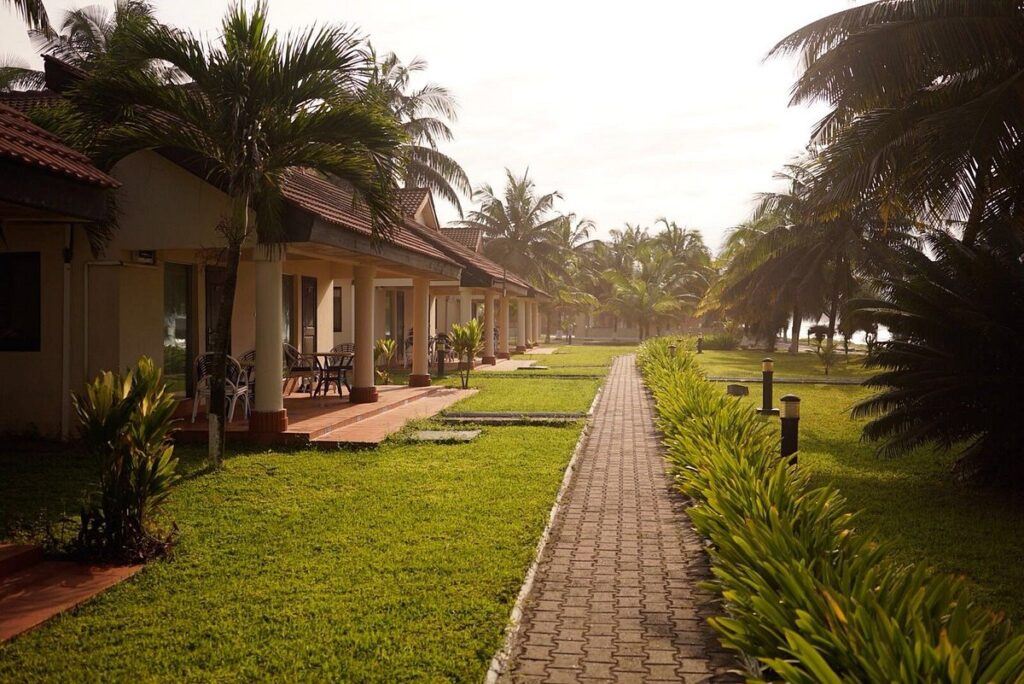
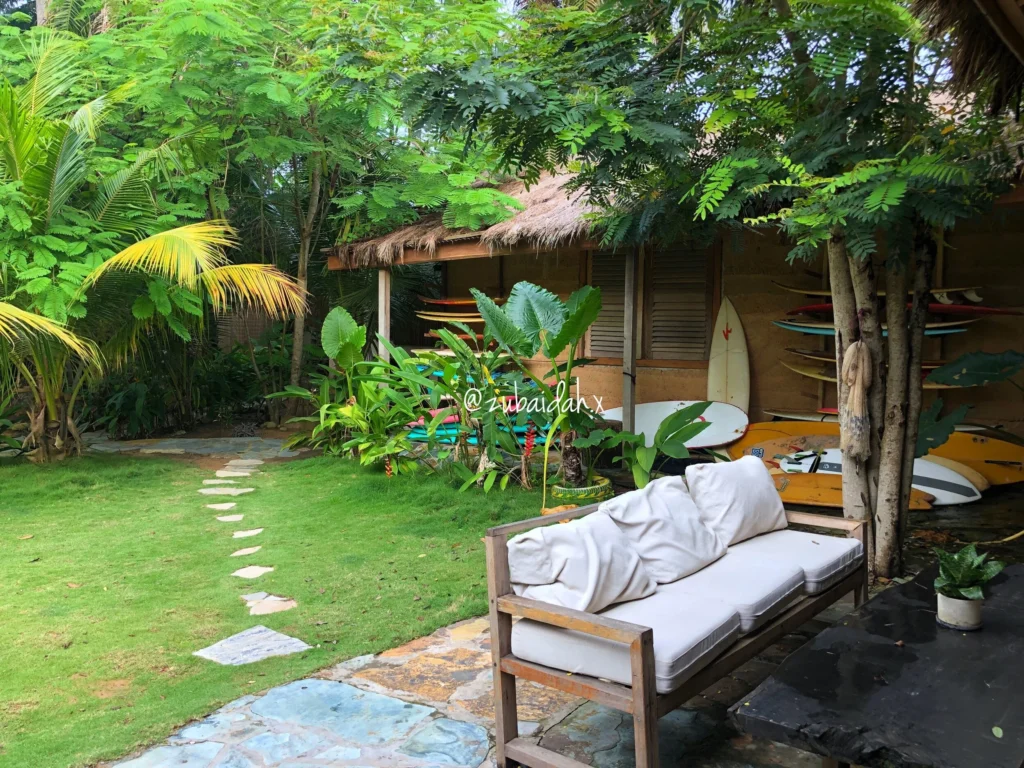
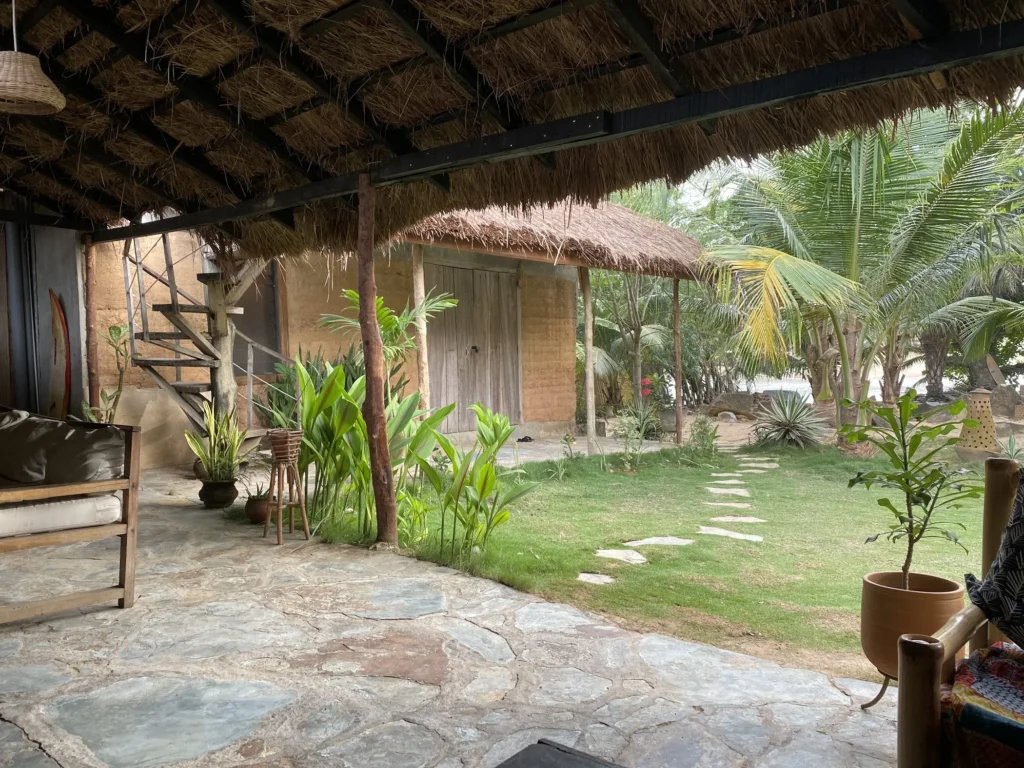
What Makes It Special: Built with genuine consideration for environmental impact, Ahanta employs eco-friendly construction methods, renewable backup power, waste separation and recycling, handmade eco-friendly toiletries, energy-efficient lighting, and eliminates single-use plastic entirely. What sets it apart from other “eco” accommodations is that these aren’t just features listed on a website—they’re integrated into every aspect of the operation.
The food consistently earns rave reviews. The chef prepares excellent local and international dishes using locally sourced ingredients, with portions that could feed a small army. The bar serves cocktails at fair prices, and the staff somehow manages to be both professional and genuinely warm—a combination that’s harder to achieve than it sounds.
Activities & Surroundings: Surf lessons are the main draw here, with excellent instructors and quality equipment. The beach at Busua is perfect for both beginners and experienced surfers, with consistent waves and several surf schools to choose from. Beyond surfing, the beach itself invites long walks, and the water is generally safe for swimming when surf conditions are mellow.
Busua serves as an excellent base for exploring the Western Region. The historic Fort Batenstein sits just 2.1 miles away, and other coastal attractions including Dixcove and the famous fishing villages of the region are within easy reach.
Accommodation: Ten individually designed rooms, some right on the beachfront (particularly rooms 6 and 7, which are spacious, newly built, and situated across a small lagoon), others providing privacy away from the main activity. All feature fans and air conditioning, hot water showers, and spacious, clean interiors. Note that rooms aren’t soundproof, so if you’re a light sleeper, you might hear your neighbors or fellow guests enjoying themselves.
Sustainability Practices: Comprehensive eco-friendly approach including solar power, water conservation, locally sourced food, organic linens, non-toxic cleaning supplies, zero single-use plastic policy, and waste separation with recycling programs.
Getting There: Busua is accessible via Takoradi. From Takoradi, you can hire a taxi (about 30-45 minutes) or take a tro-tro toward Agona and ask to be dropped at Busua junction, then walk or catch a motorbike for the final stretch.
Budget: Mid-range. Rooms typically range from $50-90 per night including breakfast.
4. Meet Me There Eco Lodge (Dzita, Volta Region)
The Experience: Between the villages of Dzita and Dzita-Abledomi on the stunning Volta coast, Meet Me There offers something different from the mountain lodges and rainforest retreats. This is coastal eco-tourism done right, with a serious mission behind the relaxation.
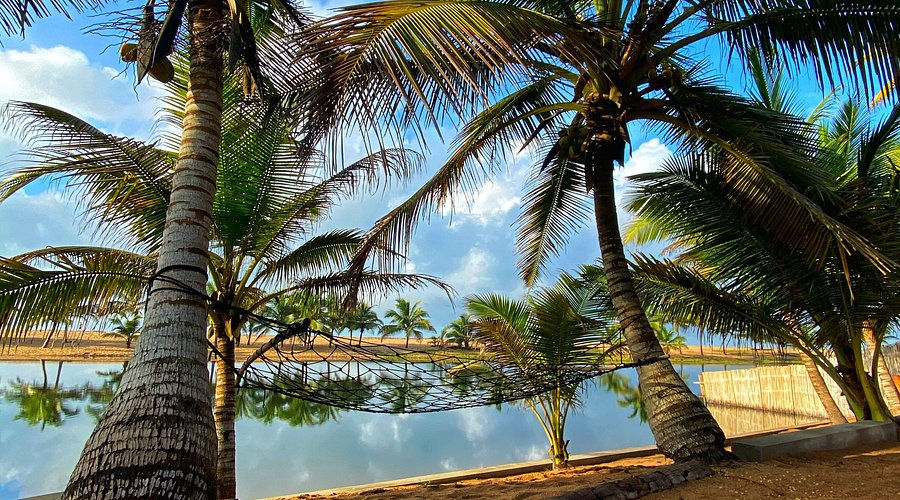
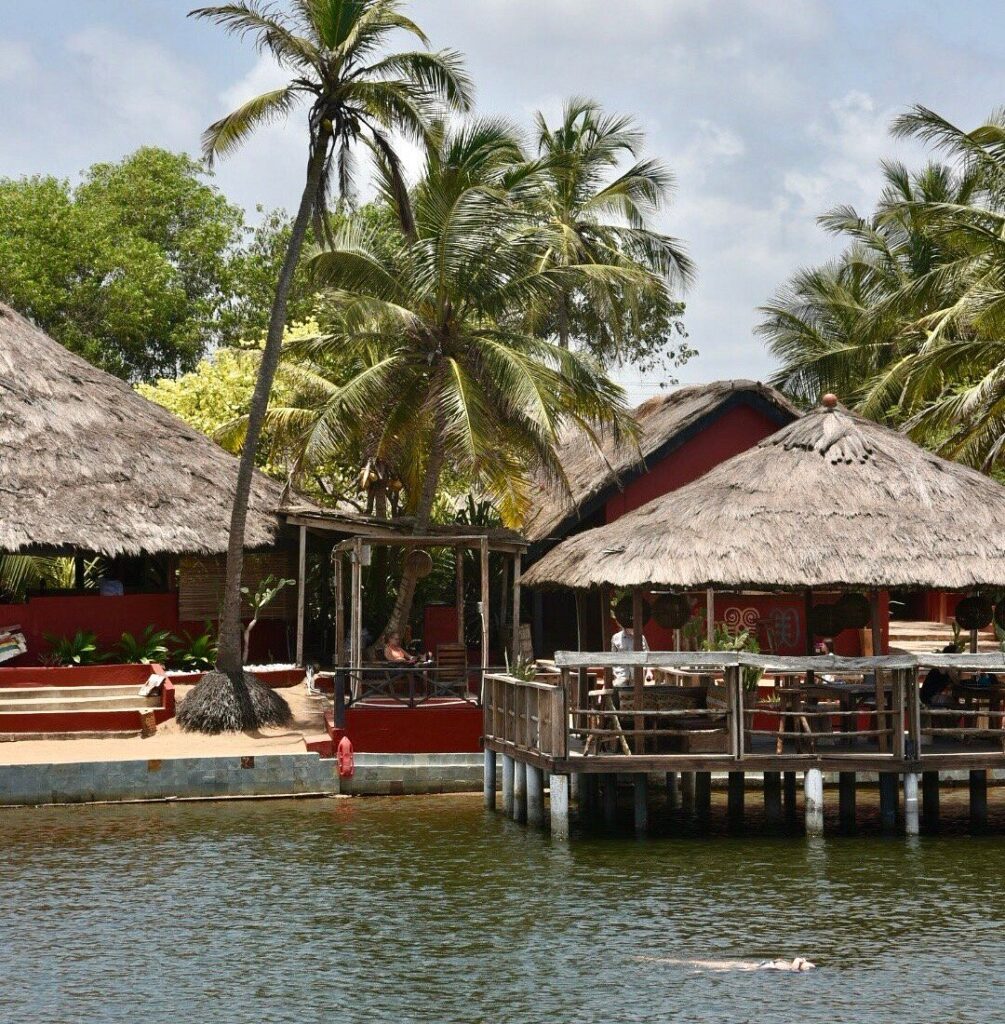
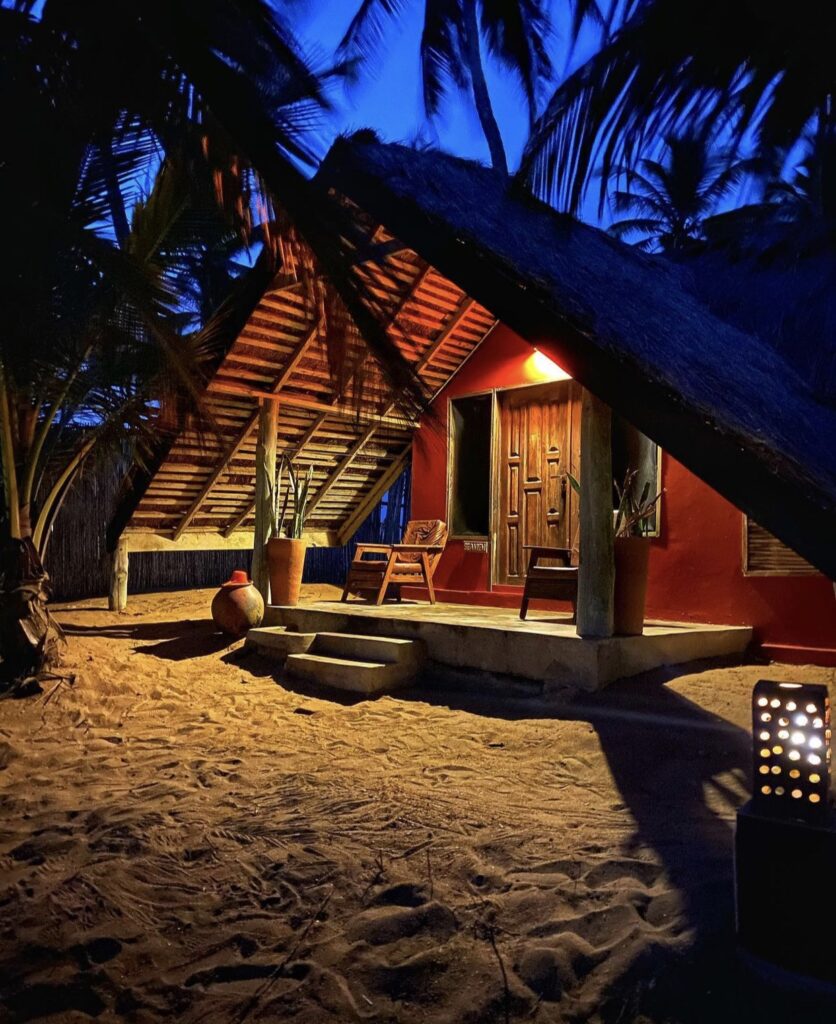
What Makes It Special: Meet Me There serves as headquarters for the NGO Dream Big Ghana, which runs community programs throughout the region. This isn’t a commercial operation with a charitable side project—it’s a charitable operation that runs a lodge to fund its work. That means your stay directly supports education, skills training, and community development programs.
The lodge is 100% solar-powered and has nearly eliminated single-use plastic. They use bamboo straws, paper takeaway packaging, and glass water bottles. Every ingredient in the bar and kitchen is sourced locally when possible, with preference given to Ghanaian-owned businesses. The on-site shop sells products from local artisans, with 100% of profits going directly to the makers.
The atmosphere intentionally leans calm and peaceful. There’s a “lodging guests only” policy to prevent day-trippers from overwhelming the space, and the vibe skews adult (16 and over) to maintain tranquility. Personal music systems aren’t permitted in public areas, and guests are asked to be mindful of noise levels—which might sound restrictive but actually creates one of the most genuinely relaxing environments you’ll find.
Activities & Surroundings: Fall asleep to the sound of crashing waves. Wake up to traditional songs of local fishermen. The beach here is beautiful and relatively uncrowded, perfect for long walks and swimming. The Volta Region offers numerous excursions including visits to Ada Foah, the historic slave trade sites, and the famous Wli Waterfalls (tallest in West Africa).
Accommodation: Simple, comfortable rooms designed with sustainability in mind. No hot water showers (cold water only), but in this climate, you’ll appreciate it. Fans keep rooms comfortable, and the design maximizes natural ventilation.
Sustainability Practices: 100% solar power, near-zero single-use plastic, local sourcing with emphasis on supporting Ghanaian businesses, mindful energy consumption, direct support for community development programs.
Getting There: Located in the Volta Region, accessible via Accra. Take a bus toward Aflao/Keta and get off at Dzita. The lodge can provide more detailed directions and may be able to arrange pickups.
Budget: Mid-range. Expect to pay $40-70 per night depending on room type.
5. Ankasa Reserve Lodge (Ankasa Conservation Area, Western Region)
The Experience: For serious nature lovers and wildlife enthusiasts, Ankasa Reserve Lodge offers unparalleled access to Ghana’s most biologically diverse rainforest. This is the lodge for people who get genuinely excited about spotting rare bird species and can spend hours watching forest elephants from their veranda.
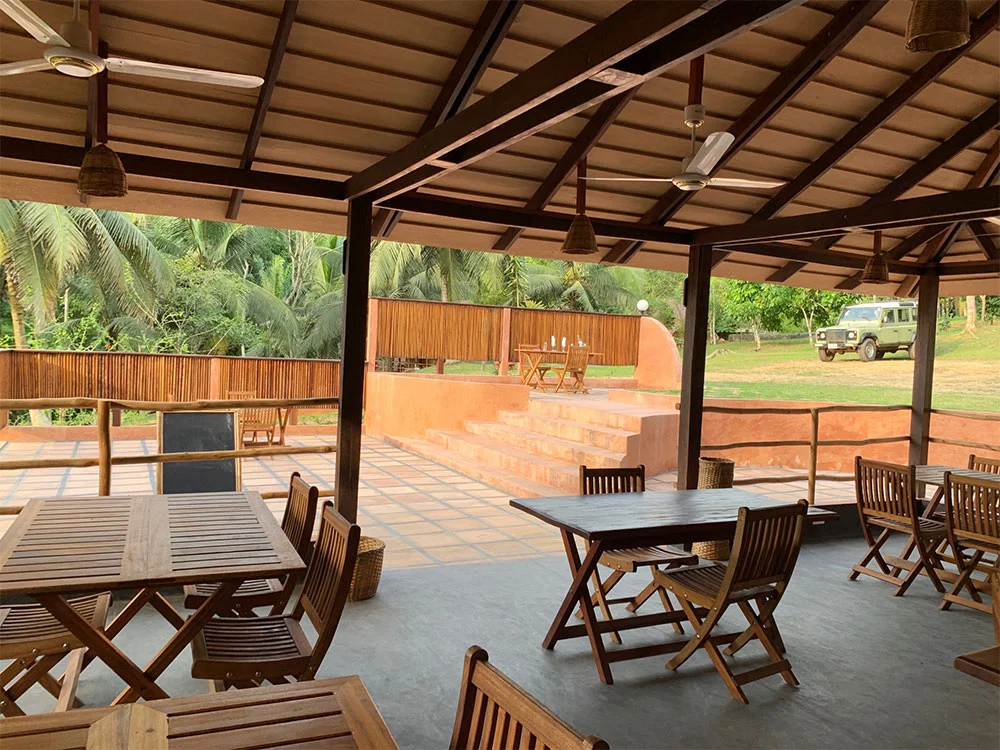
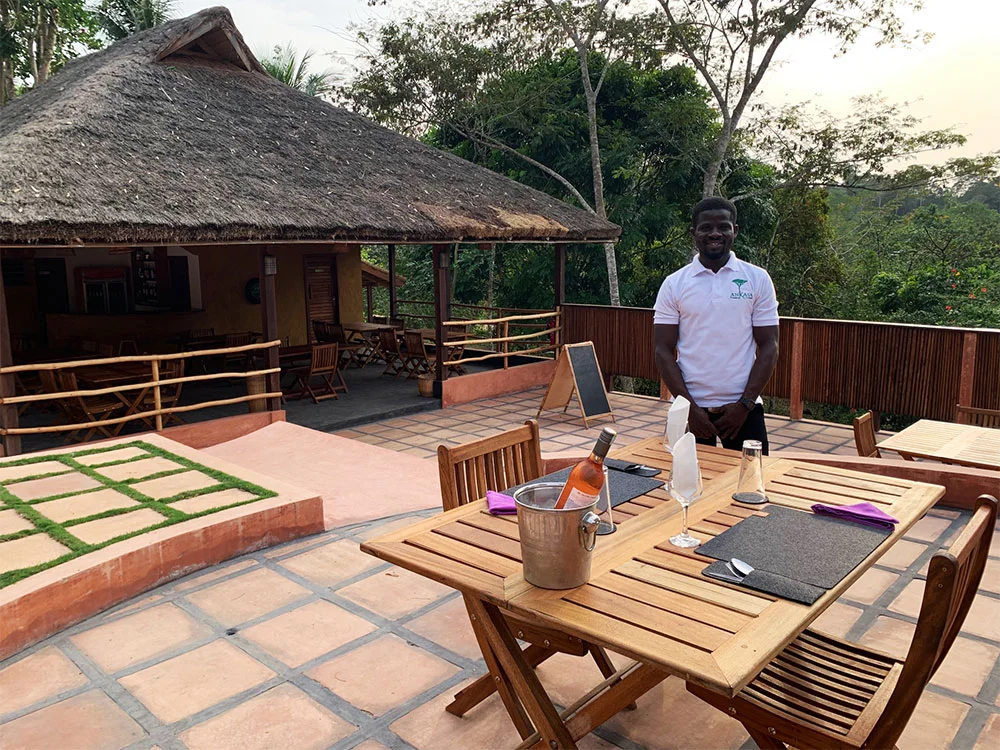
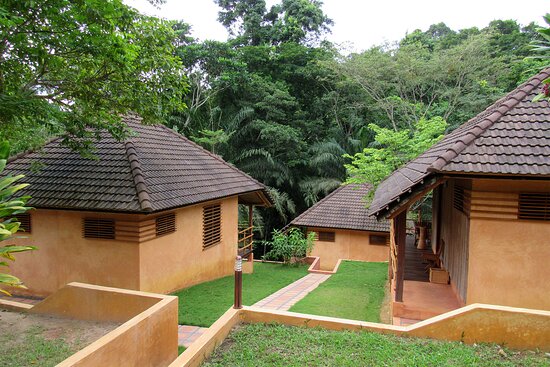
What Makes It Special: Located right at the entrance to the Ankasa Conservation Area and Nini Suhien National Park—a combined 509 square kilometers of pristine Upper Guinea rainforest—this lodge serves as the gateway to one of Ghana’s most spectacular but least-visited natural areas. The lodge has personally recorded 310 bird species in the forest and surroundings, along with 800 vascular plant species, 640 butterfly species, 45 mammal species, and over 50 amphibian species.
Bongo antelope, forest elephants, leopards, civets, genets, numerous duiker species, and 10 primate species (including rare and endangered species) roam this forest. The riverine forests protect critically endangered species like the Roloway Diana Monkey, Geoffroy’s Pied Colobus, and White-naped Sooty Mangabey.
The lodge itself achieves an impressive balance between comfort and sustainability. The executive riverfront chalets overlook the Ankasa River and primary rainforest, offering views you simply can’t find anywhere else in Ghana. Listening to troops of monkeys calling in the distance or watching beautiful forest birds from your private veranda—this is what you came to Africa to experience.
Activities & Surroundings: This isn’t a beach resort or wellness retreat. Ankasa is for people who want to be in the forest. Guided walks with expert rangers take you deep into the rainforest to search for wildlife. Birding here ranks among the best in West Africa, with species like Nkulengu Rail, Blue-headed Dove, various hornbills, and stunning kingfishers including the jewel-like Shining Blue.
The lodge can arrange specialized tours with experts in birds, mammals, butterflies, reptiles, amphibians, and flora. Night walks offer chances to spot nocturnal species like Potto and Pel’s Anomalure. The forest trails range from short walks to more demanding all-day treks.
Accommodation: Executive riverfront chalets offer the premium experience—tranquil locations overlooking the Ankasa River, comfortable beds, air conditioning, working ceiling fans, well-lit rooms (crucial for early morning wildlife viewing), and private verandas with prime forest views. Traditional raffia huts provide a mid-range option with private balconies and separate bathrooms. Budget rooms and camping options make the forest accessible to travelers on tighter budgets.
The Bongo Bar and Restaurant serves typically Ghanaian dishes with international options, all freshly prepared and well-executed. The “daily specials” board features fine dining with fresh fish, lobster, and other delicious dishes when available.
Sustainability Practices: The lodge operates as a community-run initiative, providing employment and economic benefits to nearby villages while protecting the forest. They work closely with Ghana’s Wildlife Division on conservation efforts and provide access for scientific research into biodiversity and sustainability.
Getting There: This is a genuinely remote destination. From Takoradi or Elubo, you’ll need a 4×4 vehicle to navigate the access road, especially during the rainy season. The journey is bumpy and muddy but absolutely worth it. The lodge can arrange transportation from Takoradi.
Budget: Ranges from budget camping ($5-10 per night) to mid-range traditional huts ($50-80) to upper mid-range executive chalets ($90-150), all depending on facilities and season.
6. Zaina Lodge (Mole National Park, Northern Region)
The Experience: Mole National Park is Ghana’s premier wildlife destination, and Zaina Lodge represents the country’s first attempt at luxury safari-style accommodation. This is where conservation meets comfort at the highest level—think private tented chalets with indoor and outdoor showers (for those who enjoy bathing under the stars) overlooking the vast Guinea savannah woodland.
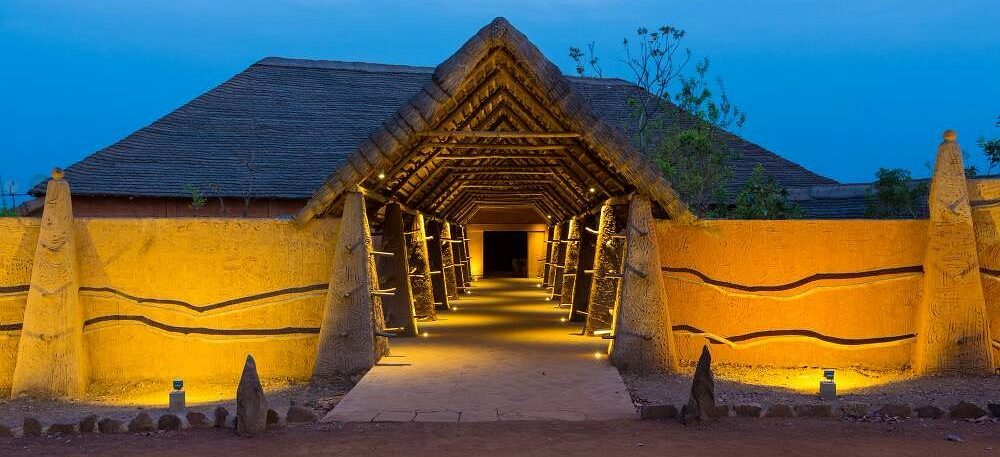
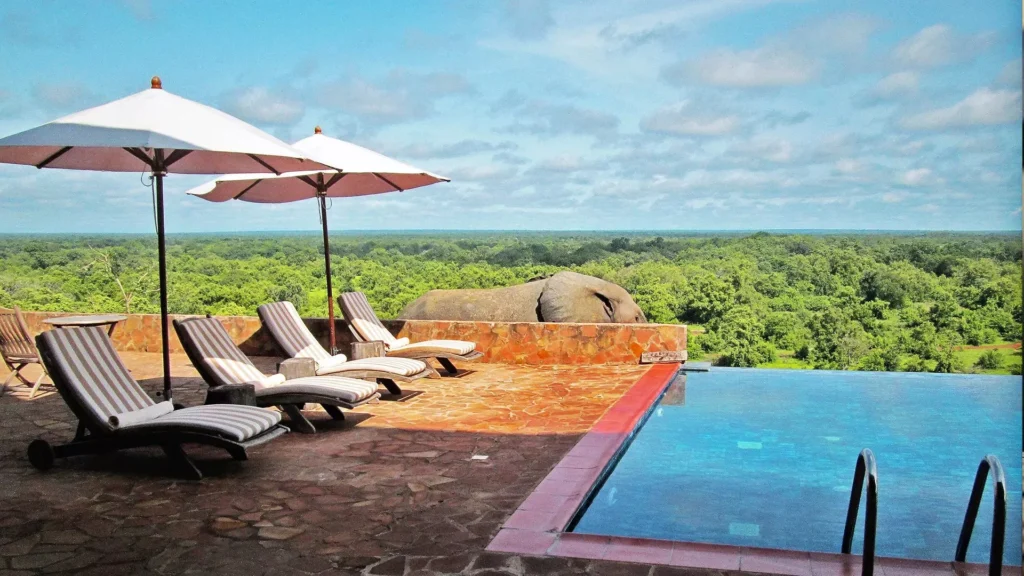
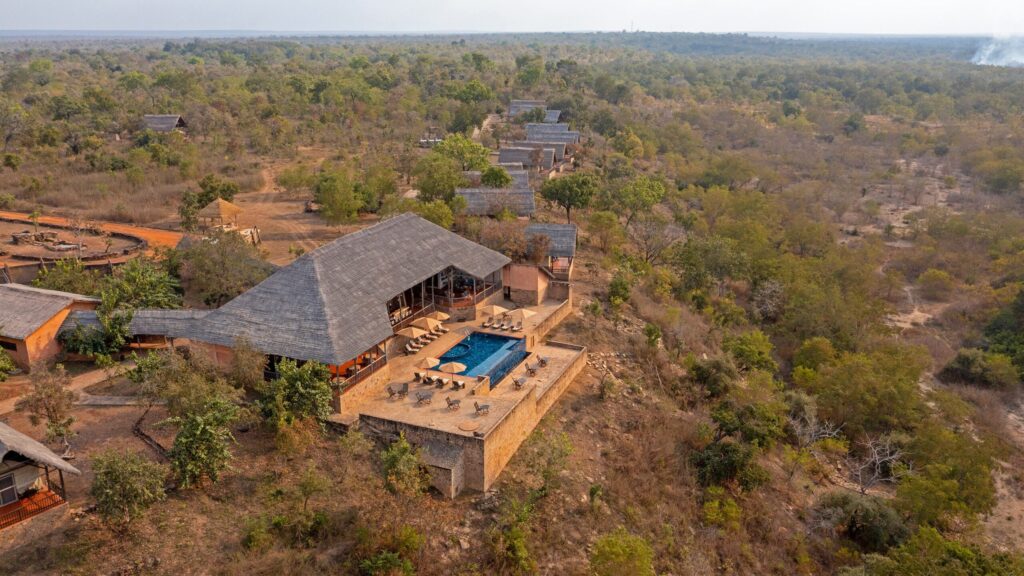
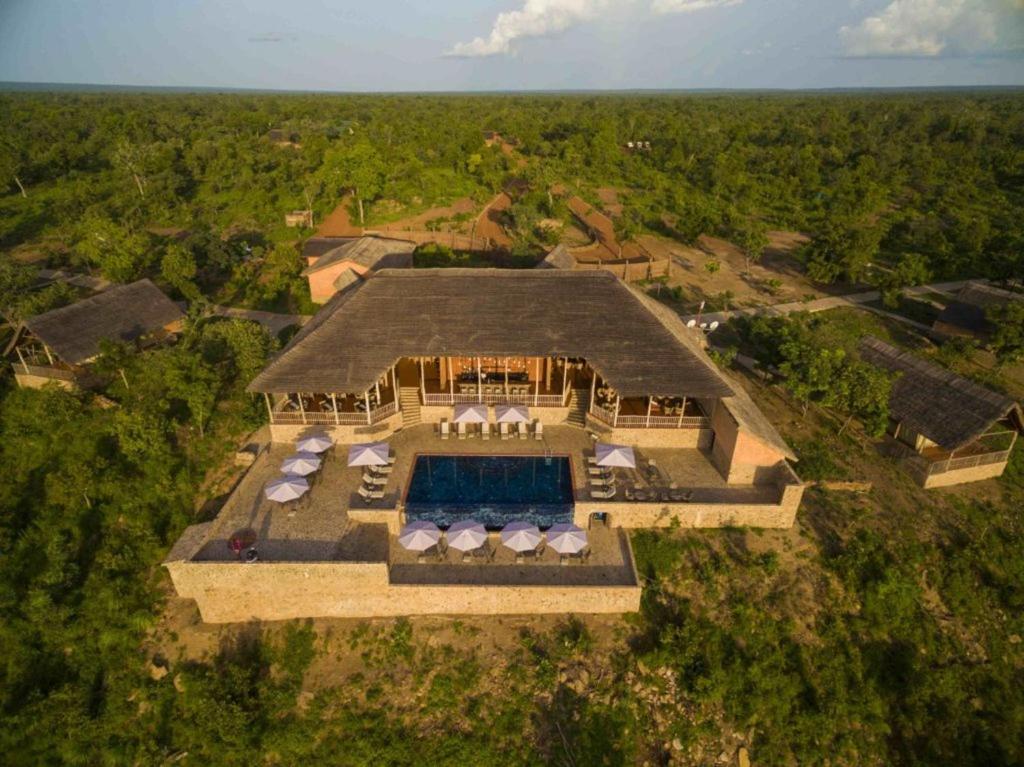
What Makes It Special: Zaina brings the East African safari lodge concept to Ghana with an emphasis on sustainability and local craftsmanship. The 24 spacious tented chalets are furnished with pieces handpicked from Ghana’s best artisans. Exterior surfaces use native stone harvested from the lodge site, and roofs feature woven thatch grass from Northern Ghana. Each chalet includes a private balcony with spectacular views over Mole National Park’s 4,849 square kilometers of pristine wilderness.
The infinity pool, open bar with fire pit, and fine dining restaurant create a luxurious base from which to explore the park. This is the kind of place where elephant sightings might happen while you’re eating breakfast on your private balcony, and where elephants have been known to pay unauthorized visits to the swimming pool during dry season.
Activities & Surroundings: Mole National Park offers Ghana’s best opportunities for large mammal viewing. The park is home to approximately 600 elephants, along with buffalo, warthogs, hippos, various antelope species including kob, roan antelope, hartebeest, waterbuck, bushbuck, and several duiker species. Predators include lions, leopards, spotted hyenas, and various smaller carnivores.
Walking safaris with expert rangers get you surprisingly close to wildlife, particularly elephants and antelope at waterholes. Mobile safari excursions by vehicle cover more ground and increase your chances of spotting shy species. The park’s 300+ bird species make it a birding paradise, with kites, Bateleur eagles, rollers, kingfishers, Egyptian geese, egrets, pelicans, and storks commonly spotted.
Beyond the park itself, the nearby eco-village of Mognori (45 minutes by bike from the lodge) offers canoe trips on the Mole River, village walks, encounters with traditional weavers and medicine men, and the chance to witness traditional drum and dance performances when arranged in advance.
Accommodation: Each of the 24 luxury tented chalets represents a step up from anything else in the park. Air conditioning, comfortable beds, handcrafted Ghanaian furnishings, private balconies, and those distinctive indoor/outdoor showers create a truly special environment. Some reviewers note that despite the luxury setting, the lodge could do more to educate guests about wildlife conservation and give back to local communities.
The on-site restaurant serves excellent food with both local and international options, though some guests report that service and meal timing can be inconsistent. Breakfast is included in rates, and the bar stays well-stocked.
Sustainability Practices: Zaina emphasizes sustainable business practices including use of locally harvested natural materials, employment of local staff, and integration with park conservation efforts. Solar power supplements the grid electricity. However, some guests note that the lodge’s conservation and community engagement mission isn’t as visible or prominent as at other eco-lodges in Ghana.
Getting There: Fly from Accra to Tamale with Africa World Airlines (daily except Saturdays), then drive approximately 3 hours to Mole National Park. The road between Tamale and Mole is now paved, significantly reducing travel time. Alternatively, buses run from Accra, Kumasi, and other major cities to Larabanga (the nearest town), from where it’s a short ride to the park.
Budget: Luxury. Rates start around $300 per night and include meals and game drives. This is Ghana’s most expensive safari lodge, but for travelers who want African wildlife viewing combined with genuine comfort, it delivers.
7. Tongo Oasis (Tongo, Upper East Region)
The Experience: If you’ve ever wondered what it’s like to live in a traditional African compound but with just enough modern comfort to remain, well, comfortable, Tongo Oasis offers exactly that experience. Located in Talensi Land in Ghana’s Upper East Region, this sustainable retreat immerses you in ancestral African living within the context of stunning natural surroundings.
What Makes It Special: Tongo Oasis isn’t trying to be a lodge in the conventional sense. It’s an educational and cultural experience wrapped in accommodation. Here, you sleep in traditional African houses, eat traditional foods prepared using ancestral cooking methods, and participate in the daily rhythms of rural Ghanaian life—but with comfortable beds, basic modern amenities, and the knowledge that you can leave whenever you want (which is the crucial difference between cultural immersion and actually being poor).
The location offers some of the most spectacular sunsets you’ll see anywhere in Ghana. The famous Tongo Hills rise dramatically from the surrounding terrain, these granite rock formations making strange whistling sounds during November and December when harmattan winds blow down from the Sahara. The hills are sacred to the Talensi people and home to powerful shrines, cave schools, the chief’s palace, and numerous hiding caves that have protected people throughout history.
Run by Hawa, who has created the Oasis Pathways school and employment opportunities for local women, Tongo Oasis exists at the intersection of tourism, education, and community development. Your stay here directly supports scholarships for children and skills training for women in the Tongo community.
Activities & Surroundings: This is cultural immersion country. You can visit the Tengzug Shrine, explore the Whistling Rocks, hike through the Tongo Hills, tour the famous Cave School and Chief’s Palace, and interact with local artisans at Bolgatanga’s markets (about 20 minutes away), where the Upper East Region’s renowned straw baskets, smocks, and leather goods are sold.
The agricultural landscape around Tongo features small-scale farming of millet, sorghum, groundnuts, and various beans. Visitors can learn about traditional farming practices, indigenous wisdom regarding natural building, organic farming, herbal medicine, pottery, and food processing. This is where you come to understand how people actually lived before (and in many cases still do live) without all the modern conveniences we take for granted.
Accommodation: Traditional thatched houses designed to keep you surprisingly comfortable in the extreme heat of the Upper East (temperatures can reach 45°C in March and April). The accommodations offer basic facilities—fans instead of air conditioning—but they work. The design reflects generations of architectural knowledge about how to stay cool in one of Ghana’s hottest regions.
Meals feature local dishes built around the foundations of Gurune cooking: dawadawa (fermented locust beans), millet, sorghum, and shea butter. The signature dish is Tuo Zaafi, a hearty staple eaten with vegetable soup that will absolutely fill you up.
Sustainability Practices: Tongo Oasis embodies ancestral sustainability—using local materials, traditional building methods, organic farming, minimal energy consumption, and deep integration with natural cycles. The focus on retracing and preserving indigenous wisdom about self-sustainability makes this less a lodge and more a living classroom.
Getting There: Fly to Tamale, then arrange private transportation to Tongo (about 3.5-4 hours). The lodge has limited online presence (Instagram is your best bet for bookings), reflecting its authentic, non-commercialized nature.
Budget: Mid-range. Expect to pay around $50-80 per night, often including meals and cultural activities. Programs and cultural immersion packages may cost more but offer deeper engagement.
Planning Your Eco-Lodge Adventure in Ghana
Best Time to Visit
Ghana’s climate varies significantly by region, so timing depends on where you’re going:
Volta Region (Tagbo Falls Lodge, Meet Me There): The dry season (November to March) offers the best hiking conditions and clearest views, though waterfalls are most impressive during or just after the rainy season (April to October). The mountains can get surprisingly cool at night year-round.
Western Region Coast (Escape3Points, Ahanta Eco Lodge): December to March is peak season with guaranteed sunshine and calm seas perfect for surfing. The rainy season (April to October) brings dramatic storms, rougher seas, and challenging road conditions but also fewer crowds and cheaper rates.
Ankasa Rainforest: Can be visited year-round, but the dry season (November to March) offers easier access roads and more comfortable hiking conditions. Serious birders often prefer the rainy season when resident species are most active.
Northern Region (Mole National Park/Zaina Lodge, Tongo Oasis): The dry season (November to April) is essential for wildlife viewing as animals congregate around waterholes. This period also offers more comfortable temperatures, though it can still be scorchingly hot (especially in the Upper East March-April). Avoid the rainy season (May to October) for Mole as roads become difficult and animals disperse into the thick vegetation.
What to Pack
For All Destinations:
- Biodegradable soap and reef-safe sunscreen (essential for eco-lodges)
- Insect repellent with DEET (malaria is present throughout Ghana)
- Light, breathable clothing in natural fabrics
- Comfortable walking shoes that can handle mud
- Headlamp or flashlight (many lodges have limited lighting at night)
- Reusable water bottle (many lodges have filtered water stations)
- Power bank (electricity can be intermittent, especially at off-grid locations)
- Small first aid kit and any prescription medications
For Mountain Lodges (Tagbo Falls, Tongo):
- Light sweater or fleece for cool evenings
- Sturdy hiking boots
- Rain jacket (even in dry season, mountain weather is unpredictable)
For Beach Lodges (Escape3Points, Ahanta, Meet Me There):
- Swimwear (obviously)
- Beach sandals
- Lightweight long sleeves for sun protection
- Sarong or cover-up
For Wildlife Lodges (Ankasa, Zaina):
- Neutral-colored clothing (avoid bright colors and white for wildlife viewing)
- Binoculars (absolutely essential—don’t skip these)
- Camera with good zoom lens
- Small backpack for day excursions
Booking Tips
Most of these eco-lodges can be booked directly through their websites or by email. Some (like Escape3Points and Tagbo Falls Lodge) also work with booking platforms, but direct booking often gets you better rates and ensures more money goes directly to the lodge rather than commission fees.
Book well in advance for peak season (December-February), especially for popular locations like Escape3Points and Mole National Park. For remote locations like Ankasa, confirm your reservation multiple times and keep communication open, as reliable internet can be challenging in these areas.
Consider booking multi-night stays. Many eco-lodges offer better rates for longer visits, and truthfully, one night isn’t enough to properly experience most of these destinations. The journey to reach remote lodges also makes single-night stays less practical.
Budgeting
Budget travelers can absolutely experience Ghana’s eco-lodges. Properties like Tagbo Falls Lodge, Escape3Points (dormitory), and Ankasa Reserve Lodge (camping or budget rooms) offer options under $30 per night. Add meals ($5-15 per meal at most lodges) and transportation, and you can experience authentic eco-tourism for $50-75 per day.
Mid-range travelers ($100-150 per day) will have excellent options across all the lodges mentioned, enjoying private rooms with ensuite bathrooms, three solid meals, and organized activities.
Luxury travelers who want the full safari experience should budget $300-400 per day for Zaina Lodge, which includes high-end accommodation, all meals, and guided wildlife viewing.
Transportation Between Lodges
If you’re planning a multi-lodge trip, consider hiring a private driver and vehicle for all or part of your journey. While shared tro-tros and buses are cheap and authentic, they’re time-consuming and don’t always reach remote lodge locations. A reliable driver who knows the routes (and the condition of those routes) is worth the investment, especially if your time is limited.
Many lodges can arrange transportation from major hubs like Accra, Kumasi, or Takoradi. This costs more than public transport but dramatically reduces stress and travel time.
Health and Safety
Ghana is one of West Africa’s safest and most stable countries, and all these lodges prioritize guest safety. That said:
- Take antimalarial medication (consult your doctor well before departure)
- Ensure vaccinations are current (yellow fever certificate is required for entry)
- Drink bottled or filtered water
- Be cautious with street food in cities (though food at the lodges is generally very safe)
- Purchase travel insurance that covers medical evacuation
- Inform someone of your itinerary, especially when visiting remote locations
Supporting Sustainable Tourism in Ghana
Staying at these eco-lodges represents more than just choosing nice accommodations. You’re voting with your wallet for a different kind of tourism—one that protects rather than exploits, that shares rather than extracts, that builds communities rather than displacing them.
Ghana’s eco-lodges face real challenges. Remote locations mean higher operating costs. Commitment to environmental practices sometimes conflicts with guest expectations for convenience. Seasonal rainfall patterns affect accessibility and revenues. Supporting local employment and fair wages means higher prices than mass-market hotels.
When you stay at these properties, you’re helping prove that sustainable, community-focused tourism can work economically. You’re showing that travelers value authenticity and environmental responsibility. You’re creating economic incentives for conservation rather than exploitation.
Ghana’s eco-lodges aren’t perfect. Hot water is rare. Wi-Fi is often nonexistent. Roads are challenging. Electricity can be temperamental. Bugs are abundant. You’ll shower with a bucket and shit in a composting toilet and maybe wake up to monkeys stealing your breakfast.
And it’s absolutely wonderful.
These lodges offer something increasingly rare in our homogenized world—places that feel genuinely different, that connect you to landscapes and communities in meaningful ways, that challenge your assumptions about comfort and necessity. Places where sitting on a veranda listening to rain on a tin roof becomes the highlight of your day. Where a cold bucket shower after a long hike feels better than any five-star spa. Where conversations with lodge staff and fellow travelers reveal perspectives you’d never encounter at home.
Ghana is ready for you. Not with five-star luxury and manicured safari parks, but with something more valuable—authentic experiences in some of Africa’s most beautiful and threatened ecosystems, supported by people who genuinely care about protecting them.
The only question is which lodge you’ll visit first.
Read more articles here

